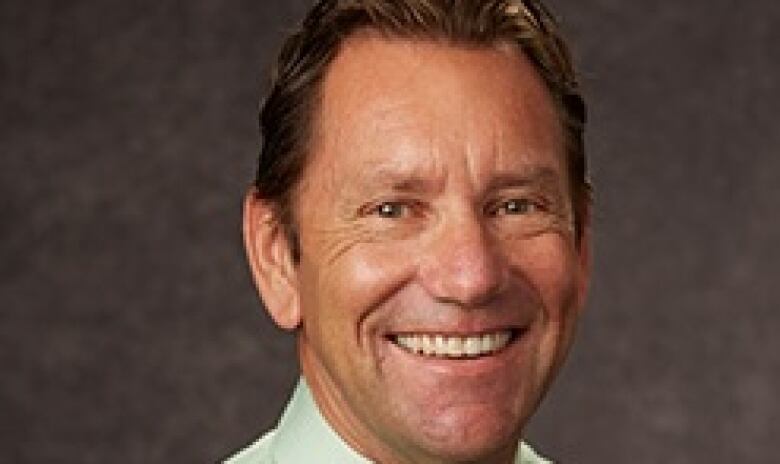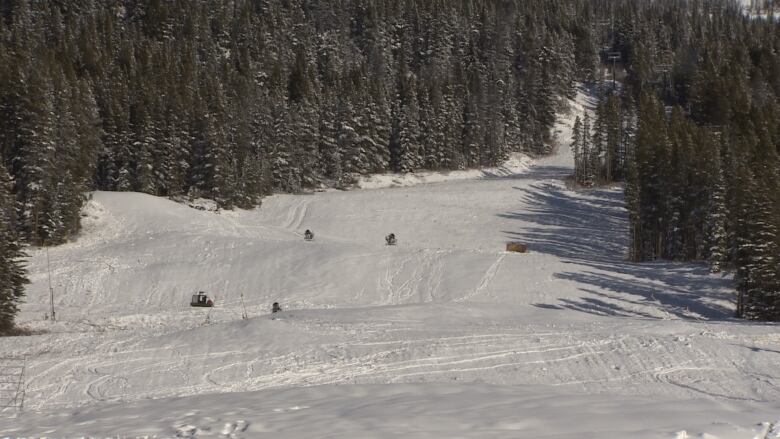Alberta ski resorts urged to diversify after World Cup event cancelled due to lack of snow
'Now they all agree that climate change is going to have an impact on the ski business'

The cancellation of the men's World Cup downhill races at Lake Louise due to lack of snowcould be a sign of things to come, with a tourism expert warning climate change could force some resorts to make all of their snow in a decade.
"I think resorts will wake up and realize they have to adapt and diversify," said Simon Hudson, director at the University of South Carolina's Center of Economic Excellence in Tourism and Economic Development.
The former University of Calgary Haskayne School of Business tourism professor says the skiing industry could see a period of significant change in coming decades.
"And you know skiing by 2050 will be a niche product for the well-off, but I think we're okay certainly for the next 10, 20 years."
- Lake Louise cancellation touches all corners of alpine skiing
- Lake Louise alpine skiing races cancelled due to lack of snow
- 'She was pretty lucky': Rescuer spent snowy night on mountain with injured hiker
He says the effects of climate change could have a significant impact in as little as a decade, forcing resorts to rely more heavily on snow production but that some resorts have the ability to cover 90 to 100 per cent of their ski areas with man-made snow.
Hudson says some resorts in B.C. and the northwest U.S. are already getting a jump on offering more than just skiing.

"I think Whistler Blackcomb receives more visitors in the summer than they do in winter," he said."And they're making a lot more money from off-snow activities, or even on-snow whether it be snowshoeing or ice skating or tubing, looking at other ways to entertain people."
The International Ski Federation announced early Wednesday the men's Lake Louise Alpine Ski World Cup was cancelled due to warm temperatures, the first time in almost three decades.
The two-day event was scheduled to start Nov. 26.
Race chairman Brian Lynam said they really had no choice in the matter.
"We have a weather forecaster that we work with that was giving us basically weather forecasts every six hours but Mother Nature is someone to be respected," Lynam said.

"The track has to be safe, so it has to be wide enough for us to install the safety systems."
Lynam said even with insurance for such incidents, it's still a loss of a lot of hard work.
"Our annual budget is in the order of about $4 million so it is a significant event," he said.
"We have to build our track basically from nothing each time so there is significant energy put into the event."
KirkTorneby, an Environment and Climate Change Canada meteorologist, says the average temperature so far this month for the Banff area is 5.9 C, which is a full 10 degreeswarmer than the November daily average from 1971 to 2000 of -4.1 C.

So far this month Banff has seen less than 2 cm of snow compared with the average November snowfall between 1971 and 2000 of 32.3 cm.
"It's been unseasonably warm and dry for most of the prairies so far through November," Torneby said in an emailed statement.
Meanwhile, Hudson says scientists are now on the same page over the impact of climate change on ski tourism.
"When I started looking at this years ago, the scientists, some were saying, 'Oh, there's going to be no impact,' some said,'Oh, yes, there is,'" he said.

"Now they all agree that climate change is going to have an impact on the ski business. And the seasons are shorter at this time of year and temperatures could rise more than 10 degrees by 2050."
But some Canadian resorts could cash in but in different ways.
"And so what we're seeing is we're getting winners and losers. Losers are in low-altitude ski resorts and winners will be high up. I've always felt that yes, it will have a negative impact on the high resorts in Canada, but we might gain by getting skiers from other parts of the world."
- MORE WEATHER NEWS |Snow plows at the ready as Calgary's warm November comes to an end
- MORE ECONOMIC NEWS |Why Alberta still has the highest employment rate in the country, despite all the job losses
With files from Kate Adach, Danielle Nerman and Genevieve Normand












_(720p).jpg)


 OFFICIAL HD MUSIC VIDEO.jpg)
.jpg)



























































































